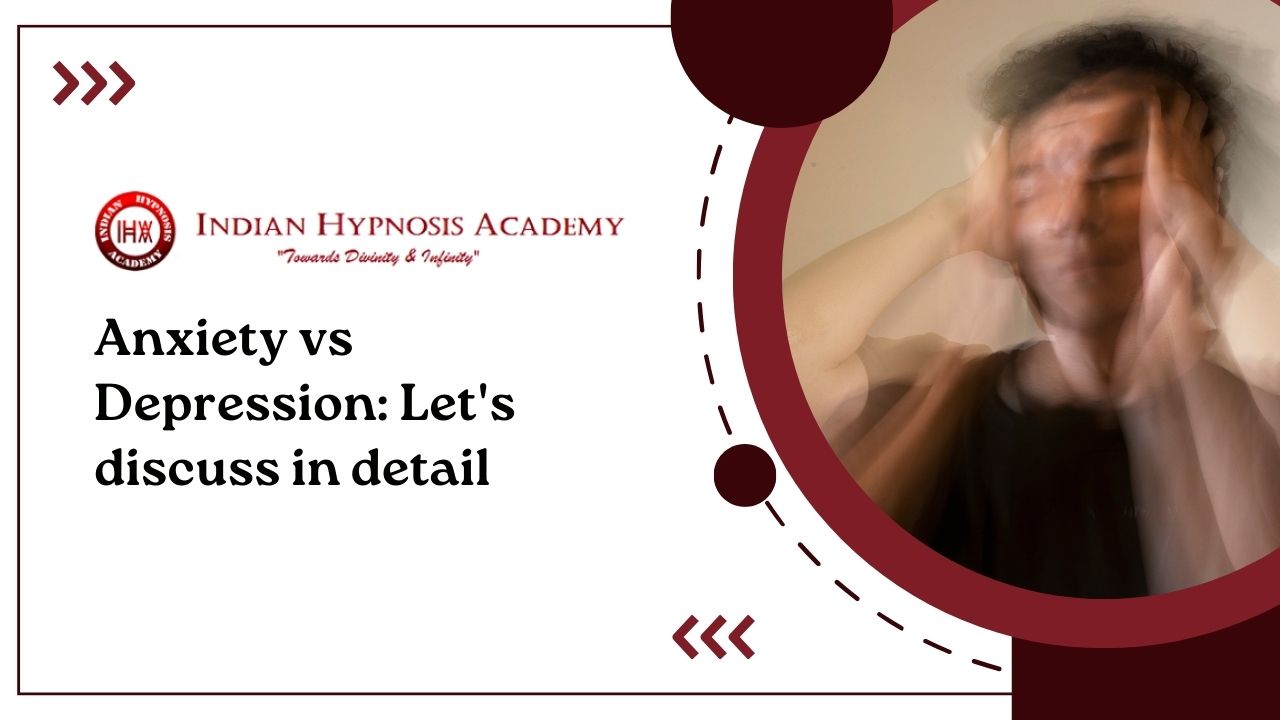Feeling overwhelmed, stressed out, or just not yourself lately? You’re not alone. Anxiety and depression are two of the most common mental health disorders affecting millions of people worldwide. In this blog post, we’ll delve into the intricate web of anxiety vs depression – exploring their nuances, impact on mental well-being, causes, symptoms, treatment options, coping strategies, and breaking the stigma that often surrounds discussions about mental health. So grab a cup of tea (or coffee) and let’s embark on this enlightening journey together!
Understanding Anxiety and Depression
Anxiety and depression are complex mental health conditions that can significantly impact a person’s daily life. Anxiety often manifests as excessive worry, fear, or unease about everyday situations, while depression is characterized by persistent feelings of sadness, hopelessness, and disinterest in activities once enjoyed.
Individuals experiencing anxiety may have physical symptoms like rapid heartbeat and sweating, whereas those with depression may struggle with low energy levels and changes in appetite. While anxiety tends to revolve around specific stressors or triggers, depression can linger for longer periods without an obvious cause.
Understanding the nuances between these two conditions is crucial for accurate diagnosis and appropriate treatment. Both anxiety and depression are valid struggles that require compassion and support from loved ones and healthcare professionals alike. By shedding light on these mental health challenges, we can work towards creating a more empathetic society where seeking help is encouraged rather than stigmatized.
The Similarities and Differences Between Anxiety and Depression
Understanding the fine line between anxiety and depression is crucial in navigating mental health challenges. Both conditions can manifest differently, impacting individuals in distinct ways. Anxiety often induces feelings of worry, fear, and unease, leading to excessive nervousness or panic attacks. On the other hand, depression typically involves persistent feelings of sadness, hopelessness, and loss of interest in activities once enjoyed.
While anxiety tends to be more centered on apprehension about future events or circumstances, depression revolves around a deep sense of despair regarding past experiences or current situations. Despite their disparities, both anxiety and depression share common symptoms like sleep disturbances, changes in appetite, irritability, and difficulty concentrating.
Recognizing these nuances can aid in seeking appropriate treatment tailored to address specific needs associated with each condition. By shedding light on these differences and similarities between anxiety and depression we can promote better understanding and support for those grappling with mental health challenges every day.
The Impact of Anxiety and Depression on Mental Health
Living with anxiety and depression can take a toll on one’s mental health. It goes beyond just feeling sad or worried; it seeps into every aspect of daily life. The constant feelings of fear and unease make it challenging to focus, sleep, or even enjoy simple pleasures.
Anxiety can manifest as racing thoughts, restlessness, and physical symptoms like rapid heartbeat or sweating. On the other hand, depression may lead to feelings of hopelessness, loss of interest in activities once enjoyed, and persistent sadness.
The impact is not only internal but also external. Relationships may suffer as communication becomes strained due to mood fluctuations or isolation. Work performance might decline as concentration wanes under the weight of these conditions.
Ignoring the effects of anxiety and depression can worsen mental health over time if left untreated. Acknowledging these struggles is an essential step towards seeking help for recovery.
Causes of Anxiety and Depression
Anxiety and depression can have various causes, some of which are interconnected. Genetic factors play a role in predisposing individuals to these mental health conditions. Family history of anxiety or depression can increase the likelihood of developing them.
Traumatic life events such as abuse, loss of a loved one, or chronic stress can trigger feelings of anxiety and depression. Neurotransmitter imbalances in the brain, specifically involving serotonin and dopamine levels, are also linked to these conditions.
Personality traits like perfectionism or negative thinking patterns may contribute to the development of anxiety and depression. Additionally, certain medical conditions like thyroid disorders or chronic illnesses can impact mental health.
Environmental factors such as living in a stressful environment or experiencing significant changes can exacerbate symptoms. It’s important to understand that each individual’s experience with anxiety and depression is unique due to the multifaceted nature of their causes.
Symptoms of Anxiety and Depression
Living with anxiety and depression can manifest in various ways, affecting individuals both mentally and physically. Symptoms of anxiety often include feelings of restlessness, excessive worry, difficulty concentrating, and even physical symptoms like rapid heartbeat or sweating. On the other hand, depression may lead to persistent feelings of sadness, hopelessness, loss of interest in activities once enjoyed, changes in appetite or sleep patterns.
Individuals experiencing anxiety might find themselves constantly on edge or avoiding certain situations that trigger their anxious thoughts. In contrast, those dealing with depression may struggle with low energy levels, irritability, or even thoughts of self-harm. It’s crucial to recognize these symptoms early on to seek help and support from healthcare professionals.
Both anxiety and depression can impact daily functioning significantly; they are not just fleeting emotions but serious mental health conditions that require attention and proper treatment for better management.
Treatment Options for Anxiety and Depression
When it comes to treating anxiety and depression, there is no one-size-fits-all approach. The treatment options vary depending on the individual’s unique needs and circumstances.
Therapy, such as cognitive-behavioral therapy (CBT) or psychotherapy, can be highly effective in helping individuals address their thought patterns and behaviors contributing to anxiety and depression.
Medication, like antidepressants or anti-anxiety medications, may also be prescribed by healthcare professionals to help manage symptoms. It’s essential for medication to be used in conjunction with therapy for optimal results.
Lifestyle changes play a crucial role in the treatment process. Engaging in regular exercise, maintaining a healthy diet, getting enough sleep, and practicing relaxation techniques can all contribute to improving mental well-being.
Alternative therapies like yoga, meditation, acupuncture, or mindfulness practices are gaining popularity as complementary approaches to traditional treatments for anxiety and depression.
Finding the right combination of treatments that work best for each individual is key to effectively managing anxiety and depression.
Coping Strategies for Managing Anxiety and Depression
Living with anxiety and depression can be challenging, but there are coping strategies that can help manage these conditions. One effective way is to practice mindfulness and grounding techniques to stay present in the moment. This can help reduce overwhelming thoughts and feelings.
Engaging in regular physical activity like yoga or walking can also boost mood and alleviate symptoms of anxiety and depression. Connecting with a support system of friends, family, or a therapist allows for open communication about how you’re feeling.
Setting realistic goals and boundaries for yourself is crucial in managing stress levels. Learning relaxation techniques such as deep breathing exercises or meditation can promote calmness during difficult times.
Incorporating hobbies or activities that bring joy can provide a much-needed distraction from negative thoughts. Remember, it’s okay to seek professional help when needed – mental health professionals are there to support you on your journey towards better mental well-being.
Breaking the Stigma Surrounding Mental Health
Breaking the stigma surrounding mental health is crucial in creating a more inclusive and understanding society. It’s essential to recognize that mental health issues are just as valid and deserving of attention as physical ailments. By openly discussing mental health, we can help reduce the shame and misunderstandings often associated with it.
Educating ourselves and others about mental health conditions can go a long way in breaking down stereotypes and promoting empathy. It’s important to remember that seeking help for mental health concerns is a sign of strength, not weakness. Encouraging open conversations about emotions and struggles can make a significant impact on those facing anxiety or depression.
By normalizing discussions around mental health, we can create an environment where individuals feel supported and empowered to seek treatment without fear of judgment. Together, we can work towards a society that values emotional well-being as much as physical well-being.
Seeking Help: A Crucial Step in Overcoming Anxiety and Depression
Seeking help is a crucial step in the journey to overcome anxiety and depression. It takes courage to reach out for support, but it’s a vital step towards healing. Whether it’s talking to a therapist, opening up to friends or family, or joining a support group, seeking help can make all the difference.
Remember, you don’t have to go through this alone. There are professionals and resources available to guide you through this challenging time. Therapy sessions can provide valuable tools and coping strategies tailored to your specific needs.
It’s important to prioritize your mental health and well-being. By seeking help early on, you can prevent these conditions from worsening and improve your quality of life. Don’t hesitate to take that first step towards getting the support you deserve.
Reaching out for help is not a sign of weakness; it’s a brave decision that shows strength and resilience. You deserve happiness and peace of mind – don’t hesitate to seek the help you need.
Conclusion
Seeking help is a crucial step in overcoming anxiety and depression. Remember, you are not alone in this journey. By understanding these mental health conditions, recognizing their symptoms, and seeking appropriate treatment and support, it is possible to manage anxiety and depression effectively. Breaking the stigma surrounding mental health is essential for creating a more supportive environment where individuals feel comfortable reaching out for help without fear of judgment. With the right coping strategies and professional guidance, it is possible to regain control over your mental well-being and live a fulfilling life. Take that first step towards healing today – you deserve to prioritize your mental health!




